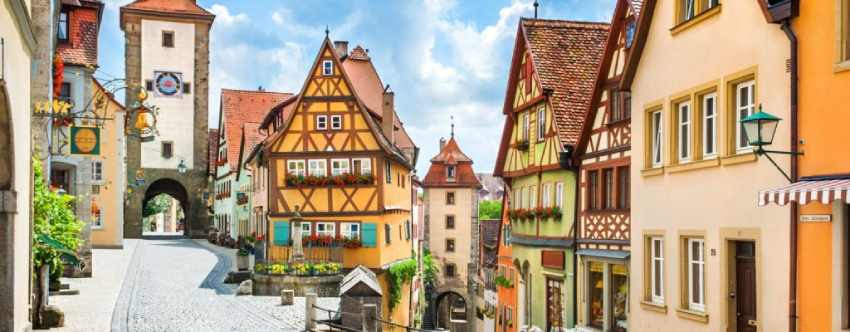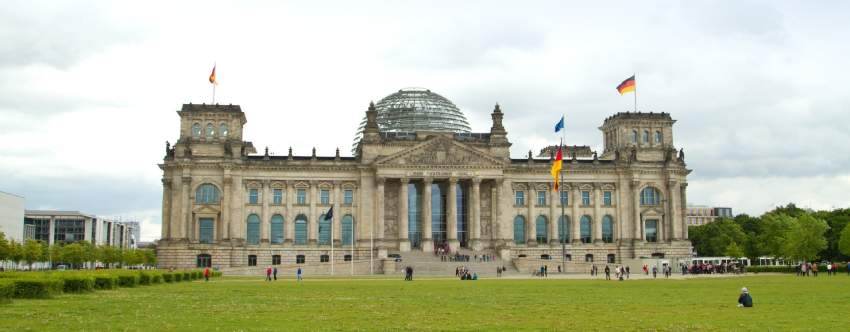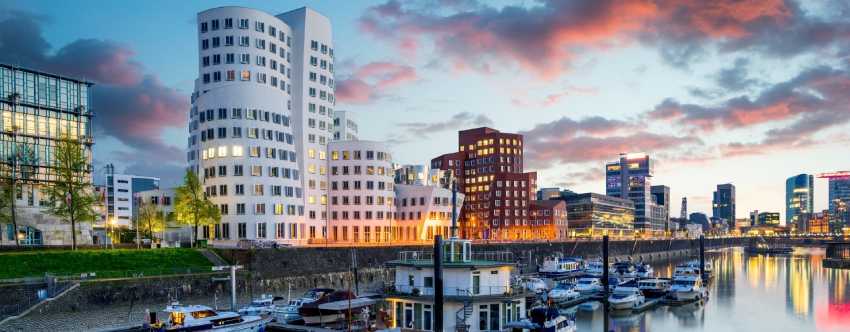Living and Working in Germany
Information & guidance about seasonal jobs in Germany
If you’re contemplating working abroad, Germany is absolutely a fantastic option. Even though the Netherlands and Germany are neighboring countries, you’ll discover a completely different environment and culture in Germany.
The country boasts vibrant cities like Berlin, Cologne, Hamburg, Munich, Dortmund, Düsseldorf, and Bremen, yet it also features stunning expansive landscapes. Additionally, you’ll find numerous historical buildings, have the opportunity to revel in the Oktoberfest festivities, savor a German bratwurst with a beer, unwind by the Brandenburg lakes, or hike through the Kniepsand dunes.
From ski slopes to lakes, hiking trails, and thermal springs, Germany’s nature is truly unique. The social climate in Germany is exceptionally pleasant, with significant emphasis on norms and values. In short, on this page, you’ll read all about living and working in Germany.
Seasonal jobs in Germany
We don’t have any jobs matching this search. Below you’ll find a selection of our most popular vacancies!
- Tourism
- Cyprus, Greece, Spain
- Host, Hotel jobs, Leisure, Tourism
- Croatia, France, Greece, Italy, Spain, Turkey
Working in Germany
Working Conditions in Germany
The German economy is regarded as the fourth strongest economy in the world. This makes Germany a land of immense opportunities for employment.
A standard German workday usually spans from 9 to 5. According to German law, an average workday comprises 8 hours. The maximum number of hours one can work in a week is 48.
Germans prioritize a healthy work-life balance and have laws in place to protect workers’ rights. For instance, employees are entitled to 20 vacation days per year.
Holidays in Germany
There are a total of 9 official holidays and 7 regional holidays in Germany. Official holidays are celebrated nationally, while regional holidays are observed only in specific German regions.
The official holidays in Germany include New Year’s Day (January 1), Good Friday, Easter Sunday, Easter Monday, Labor Day (May 1), Pentecost, Ascension Day, Pentecost Sunday, and Pentecost Monday. Christmas Day (December 25) and Boxing Day (December 26) are also holidays.
Work Culture in Germany
Due to its robust economy, Germany offers numerous job vacancies. Thus, it’s no problem for a Dutch national to work in Germany. If you plan to work in Germany, it’s important to understand the work culture. Germans are known for their punctuality, efficiency, and organization, and these values are reflected in their work culture.
Here are a few things to keep in mind if you’re considering working in Germany:
Punctuality is Key: Germans highly value punctuality and expect employees to arrive on time for work and meetings. If you’re running late, make sure to call or send an email to inform your boss.
Emphasis on Efficiency: In the German work environment, the focus is on getting the job done efficiently and effectively. Wasting time or resources isn’t necessary – Germans prefer to concentrate on results.
Organization Matters: Germans are known for their organizational skills, and this extends to the workplace. Expect a well-organized office with clear systems and procedures.
Hierarchy and Business Mentality
Hierarchy is more significant in Germany than in the Netherlands. This is evident in the structure of German companies, which have clear hierarchies and various layers. It’s also reflected in how Germans approach their work – they tend to be very goal-oriented and place a high value on order and efficiency.
This emphasis on hierarchy and efficiency might come across as cold or impersonal at times, but that’s not necessarily the case. Germans are also known for their dedication to quality work and take pride in doing their jobs well. So, while there might be some strict rules in the workplace, there’s also plenty of room for creativity.
Moreover, Germans are generally excellent at collaborating towards a common goal. They highly value teamwork and mutual respect.
Salaries in Germany
Salaries in Germany rank among the highest in the world. For instance, the average gross monthly salary of a customer service representative in Germany is €2610.
The salary amount is stipulated in the contract, where bonuses and salary evaluations are typically discussed as well. In most cases, a 13th-month salary is also paid out, usually around December or split between Christmas and summer vacation. In certain management positions, a 14th-month salary might even be provided.
German Tax Authority for Working in Germany
The primary tax authority in Germany is the Bundeszentralamt für Steuern (Federal Central Tax Office). This federal government agency is responsible for tax collection. Each federal state also has its own tax office (Finanzamt), which is responsible for collecting state taxes.
Taxation When Working in Germany
Income tax, referred to as loonbelasting, is a form of social security contribution deducted from your salary by your employer. It’s used to finance things like health insurance and pension benefits. The current income tax rate in Germany is approximately 20%.
Tax Filing When Working in Germany
If you reside in Germany, you are required to file a tax return every year. This process usually takes place online, with the deadline typically being the end of April.
Pension System When Working in Germany
Germany has a pension system that offers retirees a basic level of financial security. The system is funded through contributions from employees and employers, as well as government subsidies.
To be eligible for a pension, you must have worked in Germany for at least five years. However, even if you haven’t worked in Germany for five years, you can still receive a partial pension.
Retirement Age in Germany
The retirement age in Germany is 67 years. However, if you have worked for at least 45 years, you can retire early at the age of 65. And if you have worked for at least 35 years, you can retire at the age of 63.
Childcare Allowance When Working in Germany
If you are moving to Germany with your child(ren) to work, it’s essential to find out if you qualify for childcare allowance.
To qualify for childcare allowance in Germany, you must meet the following criteria:
- You are employed in Germany (as an employee or self-employed)
- Your child is younger than 3 years (or younger than 6 years if your child has special needs)
- You are not already receiving childcare allowance from another country
If you meet all the criteria, you can apply for childcare allowance from the German government. The amount of the allowance depends on your personal situation, but it can cover up to 85% of your childcare costs!
Working in Germany: What Do I Need to Arrange?
Working abroad is a unique experience, and while it comes with many advantages, taking the step can also be quite exciting. That’s why we’ve compiled a list of what you need to have and arrange to work in Germany.
What Do You Need to Work in Germany?
First and foremost, it’s important to check if your ID card or passport is still valid. With your Dutch passport/ID card, you’re allowed to work and live in Germany for up to 3 months.
Once you arrive in Germany, you need to register with your new municipality. Go to your local city hall (Stadt- or Gemeindeverwaltung) and bring along the following documents:
- Proof of deregistration from your previous municipality in the Netherlands
- An extract from the birth register
- Passport/ID card
- Proof of address (your rental contract, for example)
If you plan to work in Germany for an extended period, it’s important to apply for a German health insurance. Your Dutch health insurance is no longer valid after 3 months. Usually, the Krankenkasse (health insurance provider) arranges this automatically through your employer.
After 5 years, you can also apply for permanent residence. For this, you need to have a German job and a good command of the German language.
It might also be useful to open a German bank account. Make sure to bring your passport or ID card and proof of address in Germany. The bank will likely ask for your German registration number. So, ensure you visit your German municipality before opening a bank account.
Experiences of Working in Germany
Before you actually take the step to live and work in Germany, it’s important to educate yourself. This way, you’ll have an idea of what to expect, and you can determine if living and working in Germany is right for you. A great way to learn more about this adventure is by reading the experiences of other Dutch people in Germany. You can, for example, join the Facebook group Nederlanders in Duitsland (Dutch People in Germany)! Read the posts that have been shared before and, especially, the comments below these posts. Additionally, you can also ask your own question in the group. You’ll undoubtedly receive multiple answers from fellow Dutch people who have gone before you.
Working in Germany: Job Vacancies
First and foremost, we recommend starting your search for a suitable job in Germany well in advance, even before you move to Germany. This way, you’ll have an idea of what to expect and won’t have to worry about your monthly income.
As a Dutch citizen, you’ll find it easy to secure work in Germany, as many companies are looking for employees who speak both Dutch and German. For example, there are many Dutch people working as customer service representatives at Zalando in Berlin. Make sure to regularly check our job vacancy page to stay updated on new job openings and career opportunities in Germany.
Job Vacancies in the German Border Region
Below, you’ll find several other job search websites where you can discover job vacancies in Germany. If you’re interested in living in the Netherlands and working in Germany, you can also use these websites to specifically filter vacancies in the border region (e.g., in North Rhine-Westphalia).
Living in Germany
Pros and Cons of Working in Germany
Gasoline and housing prices are low in Germany compared to some other western Europe countries. Houses are even larger and more affordable. These are important advantages of working in Germany for many people. Additionally, Germany offers a fantastic nightlife, including the clubs in Berlin and the German Oktoberfest.
Accommodation in Germany
The cost of accommodation varies by region. For example, in a quiet town on the North Sea, you can easily find a luxury studio for €200 per month. In a big city like Berlin, you’ll pay more for an apartment. For a 1-room apartment in the center of Berlin, the average cost is around €1,208.96. Useful websites for finding housing include:
- www.spotahome.com
- https://www.immobilienscout24.de/
- https://www.immonet.de/
- https://www.wg-gesucht.de/
- https://www.immowelt.de/suche/berlin/immobilien
There are also various Facebook groups where you can look for housing:
- WG Zimmer Wohnung in Berlin Room Flat
- Berlin Housing
- Find A Room/Roommate in Berlin.
In Berlin, a studio outside the center costs around €919 per month. The most charming central neighborhoods include Prenzlauer Berg, Mitte, Kreuzberg, and Friedrichshain. The neighborhoods of Neukolln, Wedding, and those around Tempelhof Park are quite popular among students. If you’re planning to live and work in Berlin soon, we recommend delving into the various neighborhoods and searching for a suitable apartment.

Transportation in Germany
In addition to having major international airports in its large cities, Germany boasts an extensive network of railways, roads, and (the famous) autobahns. Similar to the Netherlands, public transportation in Germany is highly systematic and efficiently organized.
In cities like Berlin, you can easily take the bus or metro (U-Bahn) for as little as €3. This ticket allows you to use the S-Bahn or U-Bahn metro systems three times. With a monthly pass (€86), you can enjoy unlimited use of public transportation throughout the month.
Cuisine in Germany
When you think of German cuisine, you might immediately picture (sausage) wursts, apfelstrudel, Berliner Boll, and schnitzels. However, Germany offers a wide variety of regional and seasonal dishes. From white asparagus in spring to mushrooms in summer and game meat in autumn.
Germany is also renowned for its beer breweries. Recognizable brands include Beck’s, Warsteiner, Diebels, Bitburger, and Veltins.
Surprisingly, Germany also produces a significant amount of well-aged wine. With 13 wine regions, Germany’s wine culture is rich and diverse. Another popular alcoholic beverage in Germany is schnapps (also known as Schinkenhäger). This spirit is often enjoyed with ham, which is cured over beech and ash wood during a schnapp (or: aperitif).
For such a drink, you won’t pay more than €5. Even a (0.5L) beer in a café or restaurant costs only around €4. You can buy a beer in a supermarket for as low as €0.95, and a good bottle of wine will set you back around €5. A meal will cost you approximately €11.
Nightlife in Germany
The nightlife in Germany is vibrant and diverse! For instance, Frankfurt is the birthplace of techno music. In Stuttgart, located in the southwest of Germany, you can also enjoy a lively nightlife. The city is home to numerous breweries, wine bars, discos, and clubs featuring jazz music.
However, when it comes to nightlife, Berlin takes the crown. The clubs in Berlin are constantly evolving, offering electronic music and techno enthusiasts a paradise. Most clubs are open every day, and bars and clubs in Berlin don’t have a mandatory closing time. Many venues stay open until 5 in the morning or even later. The prices are quite reasonable too. It’s often not more than €15 to enter a club (excluding drinks).
If you’re planning to work in Germany and enjoy a night out, it’s definitely worth paying a visit to Berlin.
The Landscape and Nature of Germany
The nature in Germany is incredibly diverse. You can find practically all types of landscapes there, from expansive natural areas, plains, lakes, and heathlands to towering mountains.
There are many beautiful regions, each with their own distinct character. Close to the Netherlands, you’ll find the Moselle, the Eifel, and the Sauerland. A bit further are the Black Forest, Thuringia, and unique landscapes such as the Baltic Sea coast and the Elbe Sandstone Mountains in the Saxon Switzerland.
The north of Germany is also surprisingly abundant. There are incredibly diverse heath landscapes to be found there. Along the Baltic Sea, you can enjoy refreshing winds and stunning landscapes with white chalk cliffs and small islands. Go cycling through towns and villages with beautiful castles, parks, and mansions.

The Climate in Germany
Germany boasts a temperate climate, with average temperatures ranging from 0°C in winter to 22°C in summer. However, the country experiences a wide range of weather conditions depending on the time of year and location.
As a general rule, the further north you go in Germany, the cooler the climate becomes. The southern part of the country tends to be warmer than the north, with average temperatures approximately 10°C higher.
Must-See Attractions in Germany
Berlin Wall
While the bear is a symbol of Berlin, the city is truly globally renowned for the Berlin Wall. From 1961 to 1989, this wall divided the communist East from the capitalist West of Berlin. Families were torn apart, leading to profound sadness. Yet, many attempted to cross the border. Much information about this tumultuous period in Germany can be found at the iconic border checkpoint, ‘Checkpoint Charlie’. Although the wall is long gone, remnants still linger in the city.
Christmas Markets
Germany is famous for its Christmas markets. This reputation makes Germany a popular destination. For the ultimate Christmas experience, Germany is the perfect place. The Germans are masters at embracing the winter season with a festive spirit. Loaded buses depart from the Netherlands and Belgium to cities like Hamburg, Cologne, Oberhausen, Düsseldorf, and Munich.
These days, a visit to a Christmas market is not just a quick shopping trip; whole weekends are devoted to the experience. German cities create a storybook atmosphere. Delightful mulled wine, snaps, bratwurst sandwiches, and other treats turn these markets into grand celebrations. If you’re planning to work in Germany, we highly recommend exploring the genuine German Christmas markets.
Cologne Cathedral
The Cologne Cathedral has transformed into a genuine pilgrimage site, partially due to the relics of the Three Wise Men. This German cathedral has long been associated with the Christian faith. Nowadays, the cathedral draws visitors not just for religious reasons but also for its stunningly gothic appearance. Tourists seldom miss the opportunity to climb to the top of the cathedral. It’s an absolute marvel!
Oktoberfest
Since 1810, the renowned Oktoberfest has been celebrated in the German city of Munich. The festivities begin at the end of September and typically last around sixteen days, with beer flowing generously. In a massive festival tent, the Mayor taps the first beer barrel, marking the start of a massive celebration! Traditional attire includes lederhosen for men and dirndls for women. While the official Oktoberfest is held in Munich, this celebration occurs in many other places as well. Even in the Netherlands, various Oktoberfests can be found.
Europa-Park
Germany hosts several amusement parks that draw visitors from well beyond its borders, including the Dutch and Belgians. Think of Movie Park Germany and Fantasialand. However, the largest park is the slightly lesser-known Europa-Park. This park is nearly as extensive as Disneyland Paris, occupying over 950,000 square meters. Here, you’ll find attractions such as water slides, roller coasters, carousels, bobsled runs, along with numerous shows, restaurants, and animated characters. Europa-Park is divided into about fifteen thematic zones. Our country is represented in Europa-Park with attractions like ‘der Fliegende Holländer’ and ‘Piraten in Batavia’. The park and its resorts cater to families with children of all ages.

Healthcare in Germany
Germany boasts an exceptionally robust healthcare system. In the country, you have a plethora of choices when it comes to doctors and hospitals. Long waiting lists are exceedingly rare. Moreover, a substantial portion of the expenses for medical care and medications are covered by health insurance.
Health Insurance while Working in Germany
Acquiring health insurance in Germany is mandatory. In fact, you cannot work in Germany without having secured insurance. Public health insurance is obligatory for all employees earning less than €49,500 per year. Enrolling in private health insurance is only possible if you earn more! Once you have a private health insurance plan, switching back to public health insurance is no longer an option.






